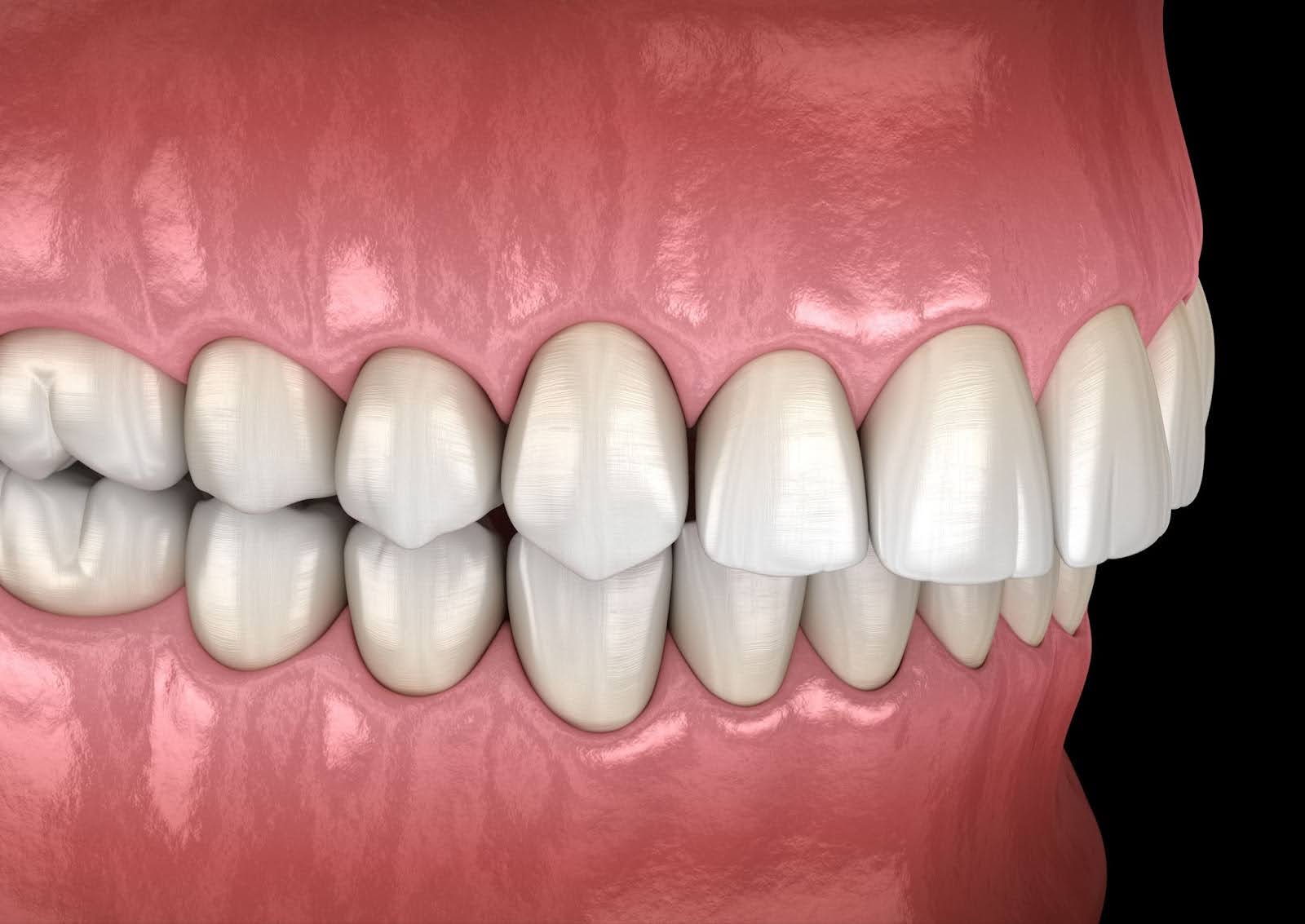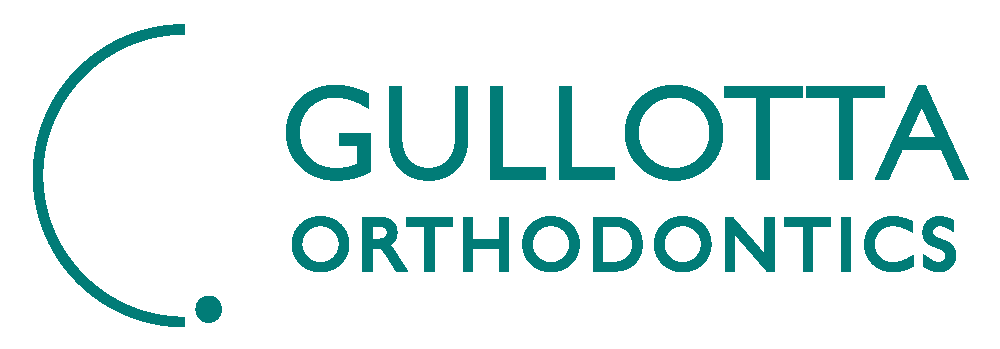Deep Bite
Get expert care from Dr Nino Gullotta and the Gold Coast’s trusted orthodontic team. We treat deep bites with proven, comfortable solutions for all ages.

What Is a Deep Bite?
A deep bite is a type of malocclusion (bite misalignment) where the upper front teeth excessively overlap the lower front teeth when the mouth is closed. While some degree of overlap is normal, a deep bite occurs when this overlap is so significant that it can cause functional and aesthetic issues. Overbite may also be used to describe a less intense deep bite.
A normal bite allows for balanced pressure distribution across the teeth and proper jaw function. However, with a deep bite, the lower teeth may come into contact with the roof of the mouth or be almost completely hidden by the upper teeth. This can lead to discomfort, uneven tooth wear, and even jaw pain if left untreated.
Deep bites can develop due to genetic factors, improper jaw growth, or long-term habits that affect tooth alignment. While some cases are mild and don’t cause immediate problems, more severe deep bites can lead to difficulties with eating, speaking, and maintaining oral hygiene.
If you’re unsure whether you have a deep bite or another bite issue, you may find our comparison of deep bite and overjet helpful.
What Causes a Deep Bite?
A deep bite can develop due to several factors, including genetics, jaw growth patterns, and oral habits. Understanding the underlying cause is essential in determining the best course of treatment.
Genetic Factors
In many cases, deep bites are inherited. The size and shape of the jaw, as well as the way teeth naturally grow and align, are often passed down through families. If a parent has a deep bite, their child may also develop one.
Improper Jaw Growth
A deep bite can result from an imbalance in the growth of the upper and lower jaw. If the upper jaw grows more than the lower jaw or if the lower jaw is underdeveloped, it can cause the upper teeth to excessively overlap the lower teeth.
Tooth Misalignment and Overcrowding
When there is insufficient space in the mouth, teeth may become crowded or pushed forward, contributing to a deep bite. This often occurs when adult teeth replace baby teeth without enough room to grow properly.
Loss of Back Teeth (Posterior Bite Collapse)
Missing molars or excessive wear on the back teeth can cause the front teeth to shift downward, making a deep bite more pronounced. Since back teeth provide vertical support for the bite, their absence can lead to an excessive overlap of the front teeth.
Childhood Habits
Certain childhood habits can contribute to the development of a deep bite, including:
- Prolonged thumb sucking or pacifier use beyond infancy can put pressure on the front teeth, pushing them out of alignment.
- Repeatedly pressing the tongue against the front teeth when swallowing or speaking can cause the teeth to shift forward over time.
Mouth Breathing
Chronic mouth breathing, often due to allergies, nasal congestion, or enlarged tonsils, can influence the way the jaw develops. This can contribute to improper bite alignment, including deep bites.


Is Having a Deep Bite Bad?
While a mild deep bite may not cause immediate problems, a severe deep bite can lead to a range of dental and health issues over time. The excessive overlap of the upper and lower teeth can put unnecessary pressure on certain areas of the mouth, affecting both function and appearance.
Potential Problems Caused by a Deep Bite
Tooth Wear and Damage
When the upper teeth excessively cover the lower teeth, they can press against them unnaturally, leading to enamel wear, chipping, and even cracking of the teeth. This can cause sensitivity and an increased risk of cavities.
Jaw Pain and TMJ Disorders
A deep bite can place additional stress on the jaw joints (temporomandibular joints), leading to discomfort, stiffness, and even TMJ disorders. This can cause pain in the jaw, face, and even headaches.
Gum Recession and Irritation
In cases where the lower teeth hit the roof of the mouth, this repeated pressure can cause gum recession, irritation, and even damage to the soft tissues. This increases the risk of gum disease and other oral health concerns.
Speech Difficulties
A deep bite can impact tongue movement, making it difficult to pronounce certain words clearly. This may result in speech impediments such as a lisp or slurred pronunciation.
Aesthetic Concerns and Self-Esteem Issues
A deep bite can affect facial appearance by creating a shorter lower face profile, making the chin look smaller or recessed. Many patients feel self-conscious about their smile, leading to lower confidence in social or professional settings.
Difficulty Biting and Chewing
When teeth don’t align properly, it can become challenging to bite into certain foods, especially harder items like apples or crusty bread. This can affect overall eating habits and digestion.
Correcting a Deep Bite
Correcting a deep bite requires a personalised approach to gradually shift the teeth into proper alignment while ensuring a comfortable and functional bite. At Gullotta Orthodontics, we offer a variety of orthodontic solutions to treat deep bites efficiently and effectively.
Treatment options vary based on the severity of the deep bite, the patient’s age, and overall dental health. Early intervention can help guide jaw growth and prevent complications, but adults can also benefit from orthodontic treatments designed to correct bite issues.
Treatment Options for a Deep Bite
1. Clear Braces
For patients who prefer a more discreet treatment option, clear braces offer the same effectiveness as traditional braces but with transparent brackets that blend in with natural teeth.
Lightforce braces are 3D-printed and custom-designed for each patient, providing a highly precise and efficient treatment for deep bites. This innovative approach ensures a more comfortable fit and can sometimes reduce treatment time.
3. Metal Braces
Damon metal braces use self-ligating technology to reduce friction and optimise tooth movement. They can be particularly effective in treating deep bites by allowing for smoother and more efficient tooth repositioning.
Clear aligners offer a removable and nearly invisible alternative to braces. They can be an effective solution for mild deep bites by gradually shifting the teeth into better alignment.
- Invisalign: A leading brand in clear aligners, Invisalign is custom-made for each patient and provides a comfortable and discreet way to correct deep bites.
- Spark Aligners: Spark aligners are designed with enhanced clarity and precision, offering a nearly invisible treatment experience for deep bite correction.
Whether using braces or aligners, our goal is to help you achieve a well-balanced, functional, and confident smile. If you’re concerned about protruding teeth, book a consultation with Dr. Gullotta and our team to explore your options.
